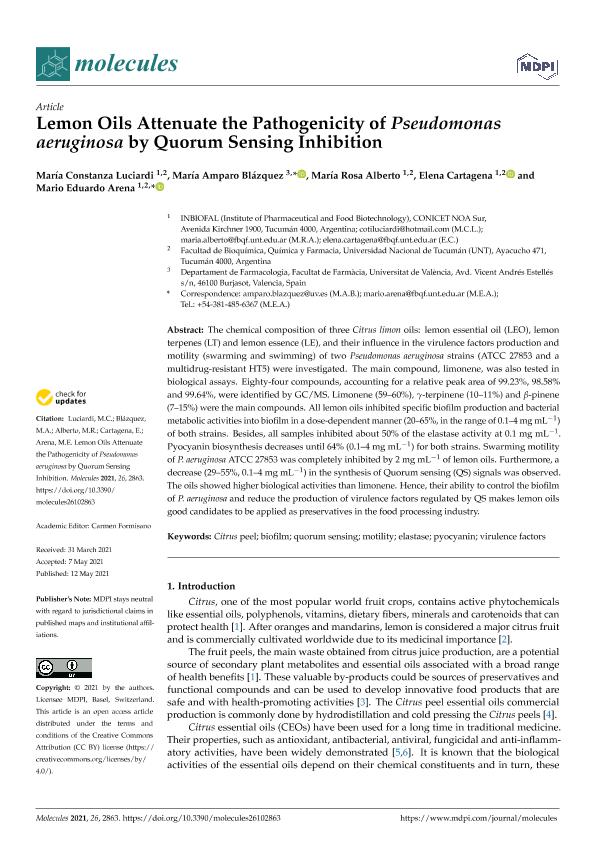Artículo
Lemon oils attenuate the pathogenicity of pseudomonas aeruginosa by quorum sensing inhibition
Luciardi, María Constanza ; Blázquez, María Amparo; Alberto, Maria Rosa
; Blázquez, María Amparo; Alberto, Maria Rosa ; Cartagena, Elena; Arena, Mario Eduardo
; Cartagena, Elena; Arena, Mario Eduardo
 ; Blázquez, María Amparo; Alberto, Maria Rosa
; Blázquez, María Amparo; Alberto, Maria Rosa ; Cartagena, Elena; Arena, Mario Eduardo
; Cartagena, Elena; Arena, Mario Eduardo
Fecha de publicación:
05/2021
Editorial:
Molecular Diversity Preservation International
Revista:
Molecules
ISSN:
1420-3049
e-ISSN:
1420-3049
Idioma:
Inglés
Tipo de recurso:
Artículo publicado
Clasificación temática:
Resumen
The chemical composition of three Citrus limon oils: lemon essential oil (LEO), lemon terpenes (LT) and lemon essence (LE), and their influence in the virulence factors production and motility (swarming and swimming) of two Pseudomonas aeruginosa strains (ATCC 27853 and a multidrug-resistant HT5) were investigated. The main compound, limonene, was also tested in biological assays. Eighty-four compounds, accounting for a relative peak area of 99.23%, 98.58% and 99.64%, were identified by GC/MS. Limonene (59–60%), γ-terpinene (10–11%) and β-pinene (7–15%) were the main compounds. All lemon oils inhibited specific biofilm production and bacterial metabolic activities into biofilm in a dose-dependent manner (20–65%, in the range of 0.1–4 mg mL−1) of both strains. Besides, all samples inhibited about 50% of the elastase activity at 0.1 mg mL−1. Pyocyanin biosynthesis decreases until 64% (0.1–4 mg mL−1) for both strains. Swarming motility of P. aeruginosa ATCC 27853 was completely inhibited by 2 mg mL−1 of lemon oils. Furthermore, a decrease (29–55%, 0.1–4 mg mL−1) in the synthesis of Quorum sensing (QS) signals was observed. The oils showed higher biological activities than limonene. Hence, their ability to control the biofilm of P. aeruginosa and reduce the production of virulence factors regulated by QS makes lemon oils good candidates to be applied as preservatives in the food processing industry.
Palabras clave:
BIOFILM
,
CITRUS PEEL
,
ELASTASE
,
MOTILITY
,
PYOCYANIN
,
QUORUM SENSING
,
VIRULENCE FACTORS
Archivos asociados
Licencia
Identificadores
Colecciones
Articulos(INBIOFAL)
Articulos de INSTITUTO DE BIOTECNOLOGÍA FARMACEUTICA Y ALIMENTARIA
Articulos de INSTITUTO DE BIOTECNOLOGÍA FARMACEUTICA Y ALIMENTARIA
Citación
Luciardi, María Constanza; Blázquez, María Amparo; Alberto, Maria Rosa; Cartagena, Elena; Arena, Mario Eduardo; Lemon oils attenuate the pathogenicity of pseudomonas aeruginosa by quorum sensing inhibition; Molecular Diversity Preservation International; Molecules; 26; 10; 5-2021; 1-14;2863
Compartir
Altmétricas



